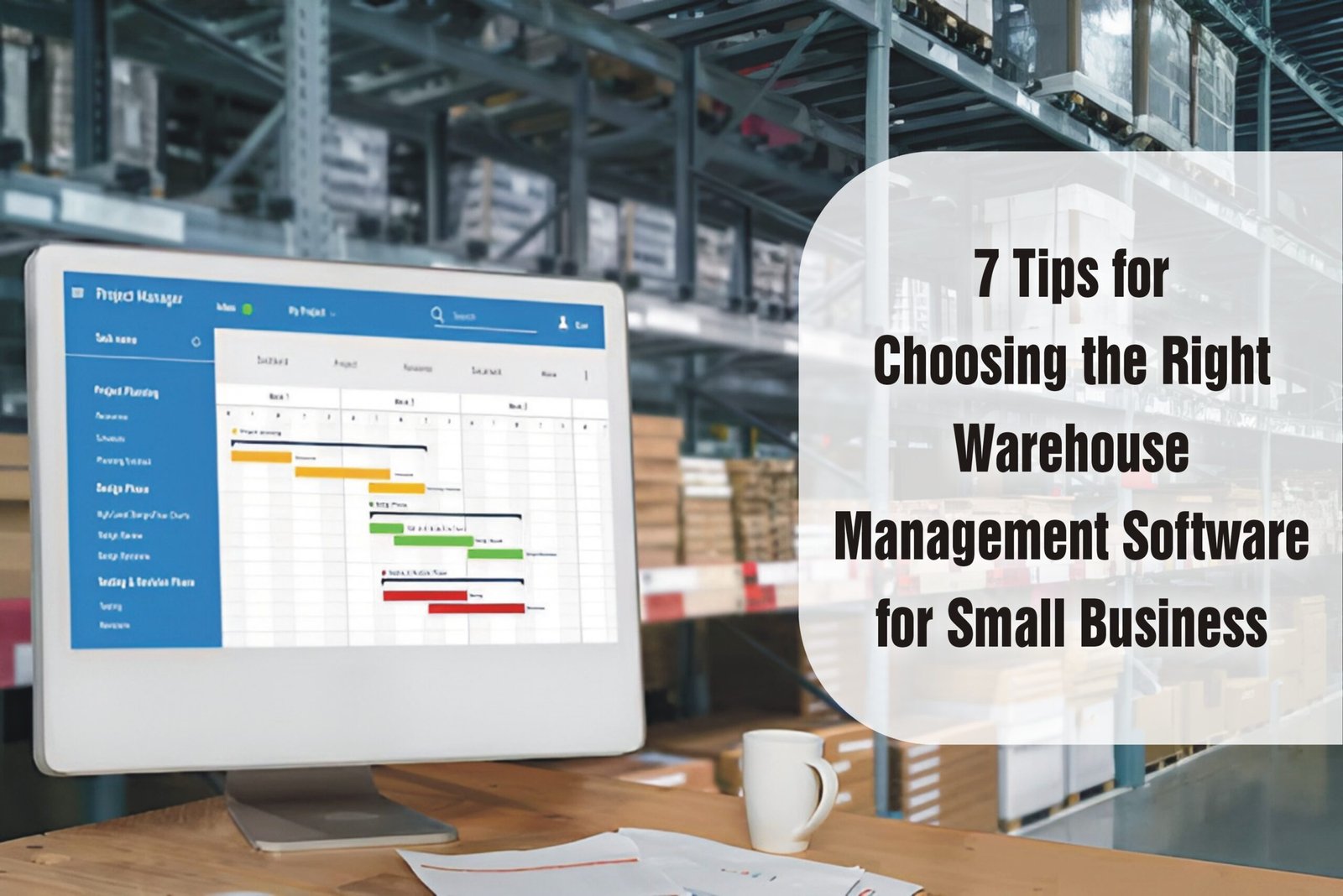Running a small business involves juggling many tasks, and managing your warehouse efficiently is crucial. Warehouse Management Software for Small Businesses can streamline operations and boost productivity. Selecting the best option can be difficult because there are so many to choose from. Here are seven tips to help you navigate this decision.
Table of Contents
Identify Your Business Needs
Before getting started with Warehouse Management Software for Small Businesses, it’s crucial to assess your specific requirements. Each business operates in its way, and what suits one might not suit another.
- Inventory Tracking: Accurate inventory tracking is vital. Do you need detailed insights into stock levels, turnover rates, and reorder points? Effective inventory tracking can prevent overstocking and stockouts, which are costly mistakes for any business.
- Order Fulfillment: Speed and accuracy in fulfilling orders are crucial. Are you looking to automate the order picking and packing process? Faster fulfillment times can lead to higher customer satisfaction and repeat business.
- Real-Time Reporting: Having up-to-date information at your fingertips can be a game-changer. Do you need real-time data to make informed decisions quickly? This can help in anticipating demand, adjusting strategies on the fly, and staying ahead of the competition.
Begin by performing an extensive evaluation of your present storage operations. Identify the pain points—those areas causing inefficiencies or errors. This will help you create a list of must-have features for your Warehouse Management Software for Small Business.
Evaluate Software Features
Not all Warehouse Management Software for Small Businesses is created equal. Some might have features that sound impressive but are irrelevant to your needs. Here’s a checklist of essential features to consider:
- Inventory Management: The core function of any warehouse software. Ensure the software can handle complex inventory needs, such as tracking items by serial number, batch, or lot.
- Order Processing: Look for software that streamlines the entire order lifecycle, from order entry to picking, packing, and shipping. Automation in these areas can significantly reduce errors and increase efficiency.
- Integration: Can the software integrate seamlessly with your existing systems, such as your accounting software, e-commerce platform, or ERP system? Integration is critical to ensure data consistency and to avoid manual data entry, which is prone to errors.
- User-Friendly Interface: A complex system can lead to user frustration and decreased productivity. Ensure the software has an intuitive and easy-to-use interface that requires minimal training.
- Scalability: Your software should expand together with your business. Ensure the Warehouse Management Software for the Small Business you choose can scale with your business, adding features and handling increased volume without a hitch.
Take your time to compare different software solutions. Look for reviews and case studies from similar businesses to understand how the software performs in real-world scenarios.

Check for Customization Options
Every small business has unique needs, and a one-size-fits-all approach rarely works. Look for Warehouse Management Software for Small Businesses that offers customization options.
- Tailored Solutions: Can the software be customized to fit your specific workflow and processes? Instead of making your company adapt to the programme, customization makes sure the software adapts to your needs.
- Flexible Modules: Some software solutions offer optional modules that you can add or remove based on your needs. This modularity allows you to start with the basics and expand functionality as your business grows.
- Personalized Dashboards: Can you set up dashboards that display the most relevant information for your business? Instead of making your company adapt to the programme, customization makes sure the software adapts to your needs.
Customization options make the software more adaptable to your specific needs, improving efficiency and usability.
Consider Cloud-Based Solutions
In today’s digital age, cloud-based Warehouse Management Software for Small Businesses is becoming increasingly popular. Cloud solutions offer several advantages:
- Accessibility: With cloud-based software, you can access your warehouse data from anywhere, at any time. This is particularly useful if you have multiple locations or if you need to manage your warehouse operations remotely.
- Automatic Updates: Cloud solutions typically offer automatic updates, ensuring that you always have the latest features and security patches without any hassle.
- Scalability: Cloud solutions are highly scalable. You can easily increase or decrease your usage based on your business needs without worrying about hardware limitations.
- Cost-Effective: Cloud-based software usually operates on a subscription model, reducing the need for significant upfront investments in hardware and software licenses. This can be more cost-effective for small businesses.
Consider the reliability and reputation of the cloud service provider. Ensure they have robust security measures and a track record of uptime and performance.
Assess Vendor Support and Training
Implementing new Warehouse Management Software for Small Businesses can be a daunting task, especially if you’re not tech-savvy. This is where vendor support and training come in.
- Customer Support: Is there a dedicated support team available to help you with issues? Reliable customer support can make a significant difference in your overall experience with the software.
- Training Programs: Does the vendor offer comprehensive training sessions to help you and your team get up to speed? Proper training ensures that you can fully utilize the software’s capabilities.
- Documentation: Are there comprehensive guides, tutorials, and FAQs available? Good documentation can be a valuable resource when you’re learning to navigate new software.
Good vendor support can make the transition smoother and ensure that you’re getting the most out of your Warehouse Management Software for Small Businesses.
Evaluate Security Features
Data security is crucial when dealing with inventory and order information. Make sure the Warehouse Management Software for Small Business you choose has robust security features.
- Data Encryption: Ensure that data is encrypted both in transit and at rest to protect it from unauthorized access.
- User Permissions: Can you control who has access to specific features and data? Granular user permissions help safeguard sensitive information and prevent unauthorized actions.
- Regular Backups: Does the software automatically back up your data? Regular backups ensure that you can recover your data in case of a system failure or cyberattack.
Security should be a top priority to protect your business and customer information.

Consider Budget and ROI
Finally, let’s talk money. Setting a budget is crucial when selecting Warehouse Management Software for Small Business. You want something that fits your financial constraints but also delivers value.
- Cost-Effectiveness: Compare the prices of different software options and see what features you’re getting for your money. Don’t just look at the initial cost—consider the total cost of ownership, including maintenance, upgrades, and support.
- ROI: Think about the return on investment. How much time and money will you save by improving efficiency and reducing errors? A higher upfront cost might be justified if the software delivers significant long-term savings.
- Free Trials/Demos: Many software providers offer free trials or demos. Utilize these to test the programme before committing. This hands-on experience can help you determine if the software meets your needs and is user-friendly.
Remember, investing in the right Warehouse Management Software for Small Businesses can pay off in the long run by making your operations smoother and more efficient.
FAQs
What is Warehouse Management Software for Small Business?
How can Warehouse Management Software for Small Business benefit my company?
Is Warehouse Management Software for Small Business expensive?
Can Warehouse Management Software for Small Businesses integrate with my existing systems?
What should I look for in Warehouse Management Software for Small Business?
Conclusion
Choosing the right Warehouse Management Software for Small Business doesn’t have to be overwhelming. By identifying your business needs, evaluating software features, considering customization options, opting for cloud-based solutions, assessing vendor support, evaluating security features, and considering your budget, you’ll be well on your way to finding the perfect solution. Take your time, and do your research, also in this link, you will find some warehouse management softwares.
Also, read this!
Best Small Business Management Software










